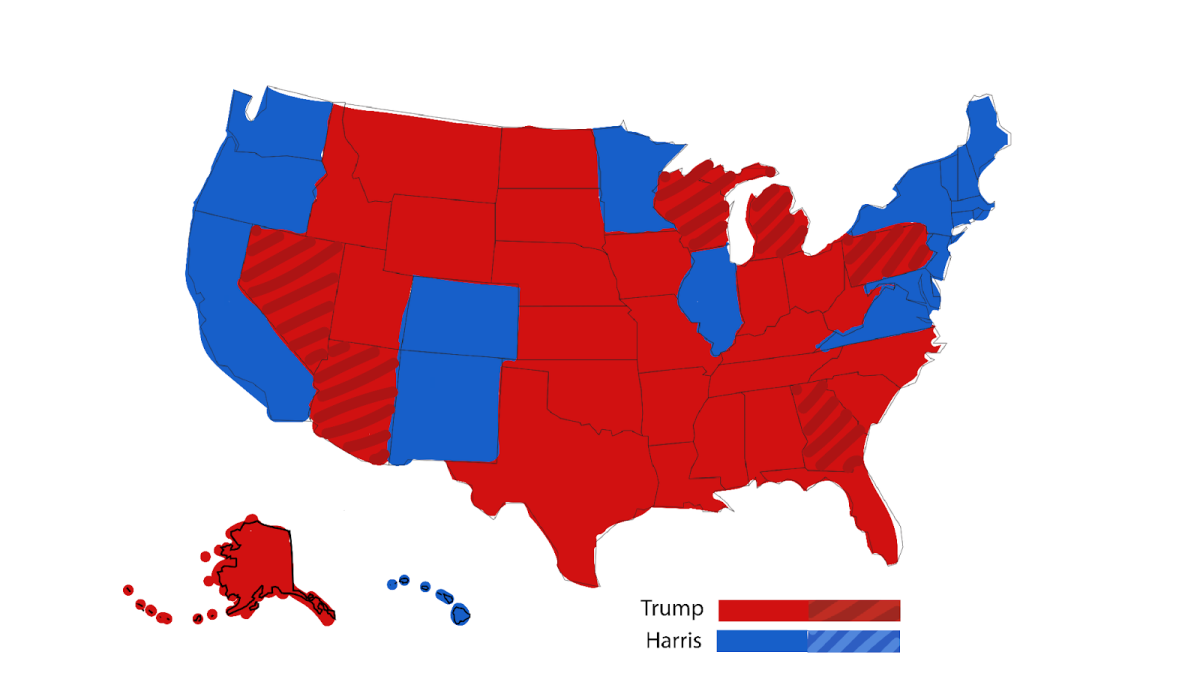On Tuesday night of Nov. 5, viewers watched as a wave of red dominated both the popular vote and the electoral college — giving Trump a sweeping win. This utterly shocked many, since not only were poll numbers for the two presidential candidates running incredibly close leading up to the election, many believed that Harris was guaranteed a win given Trump’s previous felony conviction. In 2016, Trump lost the popular vote but won the electoral college vote; however, in 2024, he won both.
America has seen a dramatic shift from blue to red in the last eight years. As someone who was keeping a close eye on both Harris’s and Trump’s marketing tactics, I didn’t see this as much of a surprise. However, many people are frightened, confused and outright bewildered by the results. So what happened? Where did Harris’s campaign go wrong, and more importantly, where did Trump’s campaign go right? Have we seen a stark alteration in American values in less than a decade?
As college students living in close proximity to each other, I also feel that it is our civic duty to acknowledge that everyone is experiencing different emotions in relation to the outcome of the 2024 election. Some are elated and are seeing this as a comeback of American values and perhaps the re-establishment of a more stable national identity. Some, especially marginalized groups, feel personally victimized and fear for their human rights. Others are also feeling skeptical about having Trump, a convicted felon with 26 allegations of sexual assault against him, serving as their president for the next four years. Regardless of where we stand, we as Christians should be mindful of an all-encompassing set of emotions across our study body.
INITIAL REACTION
In a survey of Biola students during chapel on Nov. 7, 43.2% said they were elated by the results, 7% said they were devastated, while the remaining 49.8% had mixed feelings of devastation and elation. These are strong, complicated emotions, and it’s important to understand that they are often deeply interconnected to people’s backgrounds, identities, faith, values, socioeconomic status and more. We should be mindful of how sheerly personal the last few election results have felt to individuals, and not disregard the feelings of those who disagree with us. As Christians, the most tactful thing we can do is continue exemplifying Christ in all we do, and open up safe, fruitful conversations amidst intense political strife. By authentically listening to the fears, concerns and questions of others we can learn how we can not only be stronger communicators but also what kind of character we should look for in a national leader.
With this in mind, there are a plethora of ideas flying around as to why Harris lost and why Trump won. By breaking down possible factors, we can not only analyze what happened but also what this means for the American people going forward. I want to be clear that this is not an anti-Harris nor a pro-Trump piece; it is simply an analysis of the logistical and marketing aspects of both campaigns that could shed light on the dramatic outcome on Tuesday night.
WHERE DID HARRIS’S CAMPAIGN GO WRONG?
Kamala Harris joined the campaign incredibly late after Biden dropped out of the race due to concerns of his cognitive health, including a drop in approval ratings after the first presidential debate in July. After receiving an overwhelming number of votes from the Democratic National Committee, she was appointed to be the next Democratic candidate in early August — a mere three months until election day. She would have just 90 days to pick up the pieces of Biden’s complicated campaign and garner support from left-leaning voters. Unfortunately, this gave her a stark disadvantage as Trump has been funneling his campaign for the last four years, starting as soon as he lost the 2020 election. Harris still had some headway, considering that she had a decent chance of carrying over Biden’s supporters from 2020 and having already served as Vice President for four years. However, several marketing choices may have ultimately damaged her ability to swing people from right to left and maintain a stronghold on Democratic voters, especially in swing states.
ALIENATION ON MULTIPLE FRONTS
Several choices Harris made in her campaign may have given off the impression that she wasn’t “for the people.”
At a Wisconsin rally, two voices shouted “Christ is King” and “Jesus is Lord” while Harris was speaking. Harris responded by laughing and saying, “Oh, you guys are at the wrong rally.”
As a viewer, this was utterly shocking and a poor way to handle the situation on Harris’s part. First, this shows bias toward Christian voters that assumes every Christian must be voting for Trump, which is not true. Second, it immediately alienates Christians by sending the message: “You’re not welcome here.” This also came off as rude and condescending to her audience as if she were disciplining them.
Harris does not have to be Christian in order to run for president, but she is supposed to uphold the value of freedom of religion. This was personally detrimental to many believers, who felt disliked and unvalued by Harris solely on the grounds of their faith.
Additionally, a prominent message of Harris’s campaign focused on how she grew up middle-class. While this is a great tactic for middle-class voters, it doesn’t apply to a large part of the U.S. population. The proportion of middle-class households in the U.S. has dropped from 61% to 50% since 1971, and 25% of households are considered lower class. This kind of tactic only makes certain voters feel seen and alienates those who are below the poverty line.
Many Americans also saw that unemployment and inflation rates improved with Trump’s 2016 presidency and worsened with Biden’s 2020 presidency. With Harris’s lack of acknowledgment toward the lower class, coupled with the difference in America’s economy over the last eight years, those who struggle to provide for their families could have felt driven away. Even Senator Bernie Sanders recently stated that the Democratic party has “abandoned working-class Americans.”
Furthermore, this divisiveness — both directly and indirectly facilitated by Harris — created an inconsistent campaign message. Harris seemed to base her campaign on the fact that she was not Trump, and her message was largely unreliable. While Harris claimed to be promoting unity, shunning Christian and lower-class voters did not exemplify this message. Undecided voters, including moderate Republicans — one of the primary targets of Harris’s campaign — may have not been convinced that Harris was a reliable candidate.
The democratic campaign also put a large focus on Hollywood endorsement. Taylor Swift, Scarlett Johansson, Anne Hathaway and several other starlets showed support for Harris in her campaign. However, this could have further alienated lower classes by seeing middle and upper-class voters as heavily glorified, sending the message that the campaign was a guaranteed win due to celebrity support. Harris, while making attempts to appeal to middle and upper-class voters, struggled to provide representation to the quarter of Americans making up the lower class.
LIMITED SCOPE
Harris also had a tendency to focus on a small pool of voters — stating that her goal was to focus her campaign on young voters and minorities — and it seems as though many Harris supporters assume that everyone who did not fall into these categories would also be voting for Harris.
While approximately 50–60% of young voters aged 18–24 supported Harris, this group historically only made up about 25% of voters who actually cast a ballot. A vast majority of voters are 60 and older. Not only was Harris targeting the smallest pool of voters, she was targeting a pool of voters in which she already had a majority of the vote. Rather than focusing her energy on those who were more questionable in her support, she seemed to do a lot of rallying toward her guaranteed voters.
I want to acknowledge that I am not trying to be ignorant or insensitive toward groups of voters in which key election issues are incredibly personal. This is a call that we need to be thinking of the diverse range of needs for all voters, not just ourselves.
Some Harris supporters have been ignorant of the wide range of needs in America’s society. Many people — including the 25% of households that make up the lower class — are most likely struggling to fulfill life essential needs such as food, water, shelter and safety. These needs, we can universally agree, always come first. Many of us, especially as students achieving higher education, are most likely not focused on life-sustaining needs and are rather able to focus on higher-level needs, such as education, relationships and personal endeavors. A lot of Harris’s voters expressed views tied to social issues that would fall into these higher-level categories while not being mindful of those who are unable to fulfill their survival needs.
I’ve seen several people post messages saying something along the lines of: “If you voted for lower prices over X social issue, then you are cruel, selfish and ignorant.”
Let us remember that social issues tied to identity and non-medical needs come from a very privileged standpoint. I do understand that these issues are deeply personal to voters and I do not want to imply that they are not of importance, nor do I want to water down the consequences of these social issues being jeopardized. In general, given the ups and downs in the economy over the last few years, many people had much more confidence in Trump’s economic plan over Harris’s. Putting down people who vote for economic reasons and accusing them of being discriminatory or cruel is unfortunately ignorant. A family who is living paycheck to paycheck, struggling to put food on the table, cannot be expected to put your needs above theirs.
I’ve seen many young, privileged, Democratic voters who expected people in America’s lower class to forgo their life-sustaining needs and vote for those who are primarily concerned about their higher-level needs. The reality is that many privileged voters are viewing social issues through psychological tunnel vision and ignoring the fact that for many families, lower prices mean the difference between life and death or being put out on the street.
Just because lower prices do not make much of a difference to you, does not mean that you can expect struggling families to put your needs first. Additionally, this does not mean that these people don’t care about these higher-level social issues — many of them were required to make a difficult decision in order to provide for their families.
WHERE DID TRUMP’S CAMPAIGN GO RIGHT?
Regardless of people’s opinion of Trump, he had an expert campaign that targeted a large scope of voters. Trump’s campaign primarily focused on the voters he lost in 2020 as well as garnering the support of young conservatives. Trump also had a headstart on Harris, having been strategically planning his campaign for the last four years instead of three months. However, a sweeping win by Trump and a dramatic shift from blue to red was far from expected. So what happened? If we analyze Trump’s marketing tactics, I think we may find that his win is anything but surprising.
STRATEGIC COMEBACK
At a July rally in Butler, PA, Trump was grazed by a bullet in an assassination attempt. This shocked and frightened attendees and resulted in a fatality in the audience. Some may have interpreted this as a sign that Trump was strongly disliked by the American people, but Trump strategically utilized it to heighten his fanbase. A photo of Trump throwing his fist in the air with blood on his face just after the shooting went viral, creating the image of an unstoppable American martyr that only increased supporters’ confidence in his abilities.
Every time Trump had a hiccup in his public image, he quickly turned it around to strengthen his campaign. Many people thought that Trump’s felony conviction would completely disintegrate his reputation in the eyes of voters. Instead, Trump used this to gain momentum, even utilizing his own mugshot to garner support.
The Democratic party may have had a little too much confidence that his conviction and attempted assassination would drive voters from red to blue. What they didn’t notice was that Trump was using all of these events to his advantage with an incredibly strategic marketing campaign. None of this was slowing Trump down; it was only speeding him up.
WIDE SCOPE OF APPEAL
While Harris seemed to disregard lower-class voters, Trump managed to appeal to both lower and upper classes. His wealthy, businessman reputation appealed to the upper classes who admired his marketing strategy and technique. However, his celebrity status did not keep him from catering to the lower, working classes.
Earlier this year, Trump was seen serving fries at a McDonald’s just outside of Philadelphia. This was utterly genius on multiple levels. Not only was Pennsylvania one of the key battleground states for Trump and Harris, but Trump, a wealthy multi-billionaire, showed himself working a minimum-wage job and serving food to the people.
However, he didn’t stop there. At a Wisconsin rally — another incredibly important swing state — Trump arrived in a garbage truck wearing a reflective construction vest. This was a very strategic move for him, showing his willingness to represent lower-class, blue-collar workers who felt rather unrepresented by Harris’s campaign. This class of people is very rarely ever acknowledged in celebrity culture. While Harris relied heavily on Hollywood endorsement, Trump took a very different approach by bringing himself to the people. This proved to be a success on Trump’s end, as many voters stated: “He gets us.”
Beyond socioeconomic status, Trump’s campaign saw massive gains in Latino, Asian and Black voters — something that hasn’t been seen in the last half-century for the Republican party. His appeal was not just limited to lower prices, but seemed to spill over into minority voters who saw hope in his ability to lead the country.
STRONG & CONSISTENT MESSAGE
While Harris came across as unstable, shunning Christian voters live on stage, Trump’s message always remained the same. He carried his slogan from his 2016 campaign, “Make America Great Again,” nearly eight years later. This excited voters and strengthened their confidence in Trump’s ability to fulfill his promises.
Additionally, Trump seemed to appeal to something in the hearts of Americans across the board and could have been a major contributing factor to the disintegration of the blue wall during this election. Trump is promising the people a stable, national identity — something that has become convoluted for Americans amidst intense political polarization. Trump has managed to strongly represent the American flag as well, something that has faltered in Harris’s campaign. He’s created the image of truly embodying American values, which modern Americans have been yearning for amidst intense political polarization.
WHAT DOES THIS MEAN FOR BIOLA’S STUDENT BODY?
The 2024 election has instilled intense fear and anxiety in the hearts of many who feel victimized and threatened in terms of their human rights. We should not disregard these feelings nor tell these individuals that they have no right to feel that way. The results of the election have produced a wide array of emotions depending on very personal factors that are more than worthy of discussion. However, we should not accuse people who have voted in terms of their needs of not caring about the needs of others. With two incredibly polarized candidates, many people had to make a difficult decision as to which candidate would help them provide and care for their family the most.
I want to recognize that I believe the crumbling of the so-called “blue wall” may have been a result of political and national anxiety. What it means to be an American has not only changed drastically over the past decade but has also become widely convoluted. We no longer have a stable national identity, and in a culture where one’s country is an important aspect of who they are, people are collectively longing for that. This dramatic change is not just limited to the next four years; if the Republicans do come through with their promises, this could be detrimental to the Democratic party in years to come. This could consequently lead to a drastic shift in America’s popular political values. So regardless of political stance, how can we re-balance what it means to be American?
As Christian college students, we should aim to be as unprejudiced as possible, acknowledging political anxiety and the complicated identities of others, just as Christ did. We live in a tight-knit community with our peers just next door. It’s important to remember that while in public spaces on campus, a variety of complicated, deeply personal feelings are filling the atmosphere. As mentioned in Biola’s student poll earlier, not all students were happy with the election results. Being a part of Biola’s student body means committing to treating our peers as we would ourselves, so we should learn to exhibit patience and empathy and be active listeners.
Biola is not exempt from political turmoil in any way, but as both students and followers of Christ, we are called to a peaceful and mindful coexistence. At a university that values unity in the name of Christ, we should make every effort to understand and protect the rights of others. This is easier said than done, but it starts at the individual level by creating an emotionally safe place for everyone — while not losing the foundation of a Christian identity.







